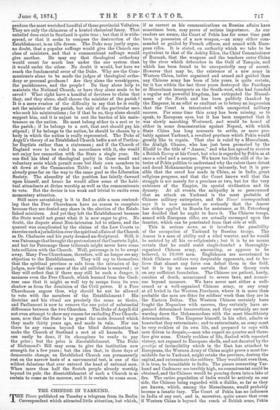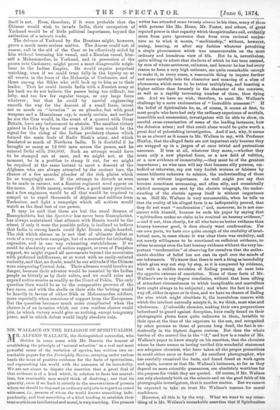THE CHINESE IN YARK1JND.
rpE Times published on Tuesday a telegram from its Berlin JL Correspondent which attracted little attention, but which, if as correct as his communications on Russian affairs have sometimes been, may prove of serious importance. As our readers are aware, the Court of Pekin has for some time past been in possession of a new weapon,—an army either com- manded or guided by French officers, and armed with Euro- pean rifles. It is stated, on authority which we take to be equivalent to that of Sir Ashley Eden, the Chief Commissioner of Burmah, that the weapons and the teachers enter China by the river which debouches in the Gulf of Tonquin, and which has been found to be unexpectedly easy of ascent. However that may be, the existence of a new army in Western China, better organised and armed and guided than any Chinese army has been of late years, is quite certain, for it has within the last three years destroyed the Panthays or Massulman insurgents on the South-west, who had founded a regular and powerful kingdom, has extirpated the Mussul- mans of the North and has been publicly thanked by the Emperor, in an edict so exultant as to betray an impression that the Court is intoxicated with unexpected military success. For some time this army has been missing, so to speak, to European eyes, but it has been suspected that it was slowly marching Westward, and would be heard of either in some demonstration against Nepaul, with which State China has long accounts to settle, or more pro- bably against Yarkund, a revolted province which Pekin would greatly like to regain. That also is ruled by a Mussulman, the Ataligh Ghazee, who has just been promoted by the Khalif to the title of " Ameer," and who has agreed to receive a British Envoy at his Court, but who is regarded by Pekin as at once a rebel and a usurper. We know too little still of the in- terior of Pekin politics to understand why the rulers there detest and dread Mohammedan progress so intensely, but it is pos- sible that the creed has made in China, as in India, great religious progress, and that the Court knows well that the struggle is not merely for a province or two, but for the very existence of the Empire, its special civilisation and its dynasty. At all events, the antipathy is so pronounced that an attack on Yarkund is the most probable of Chinese military enterprises, and the Times' correspondent says it is now menaced so seriously that the Ameer has either applied to Russia for assistance, or St. Petersburg has decided that he ought to have it. The Chinese troops, armed with European rifles, are actually encamped upon the frontier, which can be penetrated from that side at will.
This is serious news, as it involves the possibility of the occupation of Yarkund by Russian troops. The Ameer is a man of ability and a tried warrior, and he would be assisted by all his co.religionists ; but it is by no means certain that he could resist single-handed a thoroughly- organised Chinese army, amounting, as appears to be believed, to 70,000 men. Englishmen are accustomed to think Chinese soldiers very despicable opponents, and to be- lieve that almost any force can defeat them in the field, but it is by no means certain that this theory rests on any sufficient foundation. The Chinese are patient, hardy, careless of death, accustomed to severe laws, and numer- ous beyond measure. We have never met either a well- armed or a well-organised Chinese army, or any army at all levied in the Western Provinces, where it is more than probable the men are fitter for soldiers' work than they are in the Eastern Deltas. The Western Chinese certainly have fought the Nepaulese with success, they certainly have or- ganised determined insurrections, and they certainly are now warring down the Mohammedans with the most bloodthirsty determination. The Emperor himself, in his edict, admits or boasts that they exterminate; and to exterminate, an army must be very reckless of its own life, and prepared to cope with men driven to despair,—men who expect no quarter and there- fore give none. Utterly reckless of life, flashed with repeated victory, not exposed to European shells, and not daunted by the
prestige of invincibility which in the East has attached to
Europeans, the Western Army of China might prove a most for- midable foe to Yarkund, might retake the province, destroy the capital, and exterminate the soldiery. They wouldnot even then, it is true, be formidable to India. The passes connecting Yar- kand and Cashmere are terribly high, no commissariat could be obtained, and the Chinese would be pouring down into a lake of fire. The entire population of India would be actively on our side, the Chinese being regarded with a dislike, so far as they are known, which, among the Mussulmans, would probably become a fanatic fury. The Court „of Pekin has no influence in India of any sort, and is, moreover, quite aware that even if Western China is beyond the reach of British arms, Pekin itself is not. Even, therefore, if it were probable that the Chinese would wish to invade India, their occupation of Yarkund would be of little political importance, beyond the extinction of a minute trade.
The defence of Yarkund by the Russians might, however, prove a much more serious matter. The Ameer could not, of course, call in the aid of the Czar or be effectively aided by him without becoming his vassal, and a Russian vassal, him- self a Mohammedan, in Yarkund, and in possession of the passes into Cashmere, might prove a most disagreeable neigh-
bour to the Indian Empire. He would require perpetual watching, even if we could trust fully in the loyalty or, at all events, in the fears of the Maharaja of Cashmere, and of those among the Sikhs who still look up to him as to their leader. That he could invade India with a Russian army at his back we do not believe, the passes being too difficult, too lofty, and too few for regular troops, or any large force whatever ; but that he could by careful engineering smooth the way for the descent of a small force, intent not so much on " invasion " as on plunder, but with good weapons and a Mussulman cry, is nearly certain, and neither he nor the Czar would, in the event of a quarrel with Great Britain, have any inducement to abstain. The smallest victory gained in India by a force of even 5,000 men would be the signal for the rising of the Indian predatory classes which formed the main body of Nadir Shah's army, . and which desolated so much of Northern India. It is doubtful if he brought so many as 12.000 men across the passes, and he entered Delhi with 200,000. Such an attempt would have to be stamped out at once, and we might not, at the moment, be in a position to stamp it out, for we might be required at the same instant to meet a descent of the Afghans, who are always attracted by the ancient lure, the chance of a few months' plunder of the rich plains which lie so temptingly near. If the attempt to disturb us were to be made in earnest, not a Russian regiment need appear on the scene. A little money, some rifles, a good many promises, and a few engineers, would be all that would be required to compel us to expel thousands of Afghans and soldiers from Turkestan, and fight a campaign which all natives would watch as the final test of our power.
It may be said that these are but the usual dreams of Russophobists, but the Spectator has never been Russophobist, has always maintained that alliance with Russia would be the wisest, if only it were the possible policy, is inclined to believe that India in strong hands could fight Russia single-handed. The risk which alarms us is not that of ultimate defeat or even of a very serious campaign, but of a necessity for irritating, expensive, and in one way exhausting watchfulness. If we could be absolutely sure of native support, or even of Punjabee support, we might regard all movements beyond the mountains with profound indifference, or at worst with an easily-satiated curiosity, and that, no doubt, would be our attitude if the Chinese were conquering Central Asia. Their advance would involve no danger, because their advance would be resented by the Indian people as bitterly as by their rulers, and we could raise and expend native armies as readily as the Court of Pekin. The only question then would be as to the comparative prowess of the two races, and with the shells on their side the betting would be heavily in favour of either Sikh or Mohammedan soldiers, more especially when conscious of support from the Europeans. But the question becomes much more complicated when the chance is of an invasion which our own restless classes could join, in which victory would give us nothing, except temporary peace, and in which defeat would imply absolute ruin.



































 Previous page
Previous page